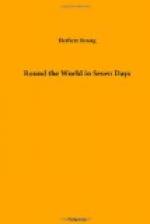Underhill, who was tired out, withdrew to the centre of the camp, and throwing himself on a tarpaulin, was soon plunged in an uneasy slumber.
It was twelve days since the wreck, ten since the boat had put off to seek assistance. When the storm had subsided, the castaways, drenched to the skin, had taken stock of their situation. It was a wild and desolate spot, far from the track of ships; months might pass before a vessel came in sight. They had only a small store of food, barely sufficient, even if husbanded with the utmost care, to last a fortnight. From their position at the foot of rugged cliffs it was impossible to tell what sustenance the island afforded, and the evil reputation of the natives did not give promise of peaceful exploration. While not actually head hunters, like the inhabitants of the New Georgian group to the south, they were said to be treacherous and vindictive. At the southern end of the island, as Underhill knew, there was a Wesleyan mission station, placed in a somewhat inaccessible spot, and at Tulagi, on Florida Island to the south, was a Government station and the seat of the Resident. It might be possible to reach one or the other of these, but even so they would be compelled to wait indefinitely, there being no telegraphic communication between either and a civilized port.
Reflections like these did not tend to cheer the castaways; but, now that the sun shone once more out of a clear sky, the invincible optimism of the British sailorman displayed itself, and the men began to scramble up the cliffs with almost light-hearted eagerness. At the top they found themselves at the edge of a dense and tangled forest. Underhill sent some of the crew to search for a likely camping place, while the remainder hauled up the boat’s cargo. A comparatively clear space, about a hundred and fifty yards square, was discovered within a short distance from the cliffs. A stream running through the midst ensured a good supply of water, and here Underhill determined to make his camp.
Great havoc had been wrought in the forest by the storm. Many trees had been snapped off or uprooted; the ground was strewn with broken branches; and when the whole party were assembled at the spot, and the arms and provisions had been covered with a tarpaulin, Underhill sent all hands to collect broken timber for forming a breastwork. Fortunately, a good number of tools had been brought from the vessel, and as the men came in with their loads, Rumbold, the ship’s carpenter, set to work, with the assistance of two or three, to surround the enclosure with a rough fence. Underhill ordered them to avoid the use of hammers and axes, the noise of which, carrying far in these solitudes, might attract the attention of the natives, who, for all he knew, had a village in the neighbourhood. There was no lack of tough creepers which were serviceable for binding the logs together, and a great number of cactus-like plants were cut down to form a defensive lining to the barricade.




